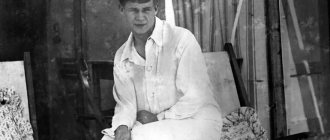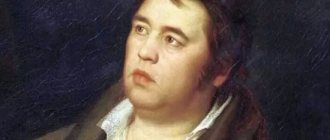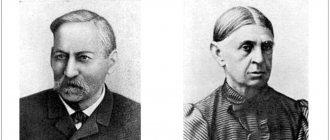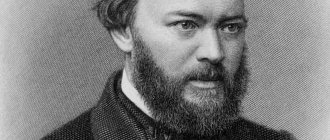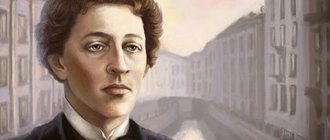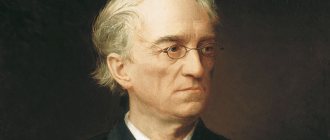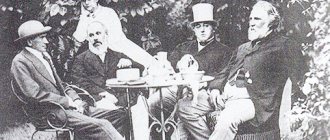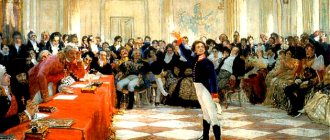- Essays
- Famous people
- Chronological table of Tyutchev’s life and work
The chronological table about Tyutchev's life includes important information about the events taking place in it. Having studied in detail the events of the writer’s life, you can see the events thanks to which he was able to become a poet. This table contains the minimum necessary to become familiar with Tyutchev’s life path.
On December 5, 1803, the future poet Tyutchev was born into a noble family, on his grandfather’s estate.
In 1810, the family moved to live in Moscow, here he was hired by a teacher who instilled in young Fedor a love of literature.
In 1812, the family temporarily moved to Yaroslavl, and when Napoleon was expelled, they returned back.
1819 Tyutchev publishes his first work; he translated “Horace’s Epistles to Maecenas.”
In the fall of 1819, Tyutchev successfully passed the exams at Moscow University and became a student.
In 1821, after receiving his candidate's degree, he received an invitation to work.
July 1822 the poet moved to live in Munich, where he lived for 22 years. Here he translates German writers.
March 1826 - Tyutchev starts a family, his wife gave birth to three daughters, they lived meagerly.
1828 publishes his first poetic work, “I Love a Thunderstorm in Early May.”
1829 - the poems “Summer Evening” and “Insomnia” were published.
1830 - the poet creates a literary masterpiece, “Autumn Evening.”
1833 - meets Ernestine Denberg, falls in love. Leaves his family and moves to live in Turin.
1836 - his poems are published in the Sovremennik magazine, owned by Pushkin.
August 28, 1838 - the poet became a widower.
1839 - Tyutchev marries for the second time, to his beloved, who bore him two sons.
1841 - he is fired from his job.
1843 - the poet began to write prose based on political articles.
1844 Moves to live in Russia and begins to lead an active life at court.
1848 articles on political topics regained the emperor's favor. Gets a job at the Ministry of Foreign Affairs in St. Petersburg.
1850 - the poet has a second, secret family. He meets Elena Denisyeva at the Smolny Institute, where she works as a teacher. She bore him two sons and a daughter; they had the difficult fate of being illegitimate.
1851 - a new wave of inspiration, new poems appear.
In 1854, the first independent collection of poems was published, and 92 new poems by the poet were published in the magazine.
1864 – the poet’s beloved woman dies of tuberculosis. Tyutchev returned to his wife.
1868 - the second collection of poems is published.
January 1, 1873 - Tyutchev was paralyzed while walking.
On July 27, 1873, Tyutchev died in Tsarskoe Selo.
On July 30, 1873, he was buried in St. Petersburg, at the Novodevichy cemetery.
Publications
After the poems “Not what you think, nature” and “Silence in the stuffy air” published in Sovremennik, the most famous poets and writers of that time began talking about Tyutchev. His poems had a philosophical and symbolic content. Nature, under the pen of Fyodor Ivanovich, became spiritualized and humanized, the image and thoughts about it became one. The poet-philosopher shrewdly sensed the inevitable turning point in his era. Tyutchev's work is imbued with anxiety and tragedy. Tyutchev never supported the revolution, but had a passionate interest in the bright events of history.
Chronological table: Fyodor Ivanovich Tyutchev (1803-1873)
Chronological table: Fyodor Ivanovich Tyutchev (1803-1873)
From Life events
At the ball I met the sister of a Bavarian publicist
Pfeffel 22-year-old Ernestina. Her elderly husband died a few days later. She became F. Tyutchev's new love. He wanted to save both his wife and Ernestina, but he could not. Ernestine left Munich. Eleanor tried to commit suicide, but remained alive, she forgave Tyutchev.
“It’s not what you think nature is” (36),
“There is silence in the stuffy air” (36)
“How joyful is the roar of summer storms” (51)
Denisyeva died in the arms of Fyodor Ivanovich Tyutchev.
Tyutchev’s relationship with Ernestina Fedorovna for long periods was entirely limited to correspondence. They subsequently met and the family was reunited. In the last years of his life, Tyutchev devoted all his energies to diverse activities with the goal of establishing the right direction of Russian foreign policy.
Creative path
At the age of 18, Fedor received the position of secretary at the College of Foreign Affairs. Later he moved to St. Petersburg, where he managed to become a freelance attaché in Bavaria. Abroad, Tyutchev actively translated the works of Schiller and Goethe. He published his poems in the magazines “Galatea” and “Northern Lyra”.
There are many significant events in Tyutchev’s biography. While living in Munich he wrote his most famous poems. During this period, his creativity flourished. In 1836, fame came to the poet.
In 1848 Tyutchev received the position of senior censor. He had no new poems, but this did not stop him from becoming an influential figure in Russian literature. Fet and Nekrasov spoke especially well of him.
In 1864, the poet was experiencing a crisis. Briefly, this period can be described as a desire for love lyrics. After the defeat in the Crimean War, Tyutchev began to call on the people for spiritual unification .
Popular topics today
Alexander Sergeevich Pushkin wrote the poem The Bronze Horseman in 1833. This poem was the completion of thoughts about Peter l, about the problems of Russia during the reign of Peter. It deals with the problem of man and
The story begins with the story of two gold miners in Alaska, who have been heading to the cache for many days. They have no food, no water, no ammunition left, they are powerless and exhausted, but they cannot stop.
There are pages in the history of Russia that are difficult to accept and comprehend even after many decades. One of these pages is the blockade of Leningrad during the Great Patriotic War.
Every schoolchild loves some subject: Russian, literature, mathematics or, for example, physical education. But my favorite lesson is history, because there are so many interesting facts that even a lifetime would not be enough to learn everything!
The work is a fairy tale for young readers, written in poetic form, and tells in an easy, accessible manner about the story that happened to a small, unreasonable animal.
Source
MAIN DATES IN THE LIFE AND WORK OF F. I. TYUTCHEV
MAIN DATES IN THE LIFE AND WORK OF F. I. TYUTCHEV
1803, November 23 (December 5 of the new style) - Fyodor Ivanovich Tyutchev was born in the village of Ovstug, Oryol province (now Bryansk region).
1810, end of the year - the Tyutchevs settled in their Moscow house in Armenian Lane.
1812, August - The Tyutchev family leaves for Yaroslavl on the eve of the capture of Moscow by Napoleonic army.
End of the year - Return to Moscow. S. E. Raich was invited to teach Tyutchev.
1813, November 12 - The earliest of Tyutchev’s poems that have reached us is “To My Dear Daddy.”
1815, end of the year - The poem “For the New Year 1816”, clearly indicating Tyutchev’s poetic gift.
1816, end of the year - 1817, beginning of the year - Tyutchev begins to attend lectures at Moscow University.
1817, October 28 - V. A. Zhukovsky visits the Tyutchevs’ house.
1817–1820 - Tyutchev meets future philosophers (Pogodin, V. Odoevsky, Venevitinov, Khomyakov, Maksimovich, Shevyrev, the Kireevsky brothers, A. Muravyov, Rozhalin, Koshelev, etc.).
1818, February 22 - A.F. Merzlyakov reads Tyutchev’s poem at a meeting of the Society of Lovers of Russian Literature.
March 30 — Elected as a member of the Society of Lovers of Russian Literature.
April 17 — Meeting with V. A. Zhukovsky in the Kremlin.
1819, August - A free translation of “Horace’s Epistle to Maecenas” was published in the “Proceedings of the Society of Lovers of Russian Literature.”
November 6 - Tyutchev became a student in the verbal department of Moscow University.
1821, April 30 - In a society of lovers of Russian literature, playwright Fyodor Kokoshkin read Tyutchev’s poem “Spring (Dedicated to Friends)” - one of the earliest poetic manifestos of the wise.
November 23 - Tyutchev graduated from the university with a candidate's degree in literary sciences.
1822, February 5 - Arrival in St. Petersburg.
February 21 — Entering the service at the State Collegium of Foreign Affairs.
June 11 - Departure for Munich as a supernumerary employee of the Russian mission.
1825, June 11 - Arrival in Russia for a vacation. November — Tyutchev’s first mature creation, “Glimpse,” is published in the Pogodin almanac “Urania.”
End of the year - 1826, beginning of the year - Tyutchev leaves St. Petersburg for Munich.
1826, March 5 - Marriage to Eleanor Peterson (Bothmer).
1827, end of the year - 1828, beginning of the year - Acquaintance with Schelling.
1828, February - Meeting Heine.
1830, April 6 - Arrival of Ivan Kireevsky and Rozhalin in Munich.
May 16 - October 13 - Tyutchev leaves for Russia for the duration of his vacation.
1833, February - Meeting Ernestina Dörnberg (Pfeffed).
1836, June 28 - August 22 - During the absence of the envoy, Tyutchev acts as charge d'affaires in Munich.
Features of the “Denisevsky cycle”
Some literary scholars believe that the cycle is very similar to a novel in verse. It can be divided into chapters, stitched together by a common idea and theme. The poems were based on the author’s real experiences and real feelings for Elena. Almost the entire “novel” is about tough love. In some poems, Denisyeva herself is the lyrical hero and everything is told on her behalf. The cycle reflected all stages of the lovers’ life together. Tyutchev sought to describe how love can be both good and terrible evil. It itself inspires and destroys everything that was built before. Fyodor Ivanovich did not forget to mention the society that controls these feelings and evaluates them. Every step of the lovers is monitored and spread by gossip. Judgment and discussion everywhere makes love become poison for the weakest of the couple.
The cycle is characterized by a comparison of love with natural phenomena, glorification of feelings and emotions, and depiction of romantic moments. The poems can be divided into two parts: some describe the tragic side of falling in love, all the troubles and obstacles that come along the way, others describe the depth and tenderness of forbidden feelings.
The heroes of the cycle seem to be confronting the whole world at once, which sets itself the goal of destroying the union. Society is portrayed as a collection of barriers and anger, unable to understand motives or forgive passion. Heroes have to defend their right to happiness. Together they are both happy and unhappy. They understand everything that is happening and are lost in feelings. They are able to reason sensibly and assess the situation, but they cannot help themselves.
In some poems in the cycle, the word “fatal” is constantly repeated, creating the desired connotation, indicating the peculiarity of the relationship of the main characters, their doom. The poet seems to curse and at the same time rejoice at that day, the meeting, the merger, the gaze that brought him together with Elena. Merging these words with the epithet “fatal”, he gives his own assessment of what is happening, focusing on the reality of the feelings experienced.
The entire cycle consists of romantic poetry depicting his relationship with Elena Alexandrovna, but among them there are also deeply tragic ones. The last poems describe the sadness of losing a loved one. The poet even depicted the last day of his beloved’s life, her every movement and the shadows that enveloped the dying woman.
The cycle ends with poems of separation. They describe the difficult fate of Elena, her premature death and regret. The poet says that many years have already passed, and he still could not forget his beloved. His soul dries up and languishes without support, wants to find its former strength, but can no longer do this.
Fyodor Ivanovich Tyutchev was able to describe all the experiences and worries that a person experiences during a relationship. This is the joy of a first date, and romantic everyday life, and even farewell to love and the bitterness of loneliness.
The cycle is rightfully considered a novel in verse, because it contains character development and action that inexorably leads to the destruction of the family and complete loneliness. You can even find a force that interferes with the achievement of happiness - the opinion of the public, which, as if with its own hands, brought the weakest - Elena - to the grave.
The poet's last muse
In 1850-1855, Tyutchev, having fallen in love with his daughters' classy lady Elena Denisyeva, created the Denisyevsky Cycle. His famous poem “Oh, how murderously we love” is dedicated to her. The love that is sung in these poems is the only meaning of life, the only way to obtain human, earthly happiness. The author calls it both bliss and hopelessness.
Publications
After the poems “Not what you think, nature” and “Silence in the stuffy air” published in Sovremennik, the most famous poets and writers of that time began talking about Tyutchev. His poems had a philosophical and symbolic content. Nature, under the pen of Fyodor Ivanovich, became spiritualized and humanized, the image and thoughts about it became one. The poet-philosopher shrewdly sensed the inevitable turning point in his era. Tyutchev's work is imbued with anxiety and tragedy. Tyutchev never supported the revolution, but had a passionate interest in the bright events of history.
Death
On January 1, 1873, Fyodor Ivanovich went for a walk, from which he was taken home in an unconscious state. The left half of his body was paralyzed. On July 15 of the same year, the great Russian poet died.
Fedor Ivanovich Tyutchev
- Russian lyricist who developed the traditions of philosophical poetry. In his work, a focus on intellectual contemplation was combined with a passionate experience of the pictures depicted, and thought and feeling were refracted through the prism of the late romantic
worldviews.
Life of F. Tyutchev in dates and facts
born in the village of Ovstug, Oryol province (now Bryansk region) into a noble family.
The Tyutchevs moved to Moscow. For the home education of young Fyodor, the poet S. Raich was invited as a teacher, who paid special attention to the development of his literary abilities.
14-year-old Tyutchev’s poem “The Nobleman (Imitation of Horace”) was read at the Society of Lovers of Russian Literature, after which the young poet became a member of this literary association.
- a period of study at Moscow University, during which Tyutchev communicated with prominent writers of that time, including V.F. Odoevsky and S.P. Shevyrev. Like many of his acquaintances, the poet at that time was fascinated by German philosophy and literature, which left a deep imprint on his spiritual and creative development.
Upon graduating from the university with a candidate's degree in literary sciences, 18-year-old Tyutchev was admitted to the State College of Foreign Affairs. The following year he went to Munich (Germany) as an employee of the Russian diplomatic mission. In total, the poet spent 22 years in diplomatic service abroad. Despite his extraordinary abilities, extraordinary education and recognition in German cultural circles, he never made a diplomatic career. His attempts to build family well-being were also not successful: a year after the death of his first wife E. Peterson, with whom he lived for 12 years, Tyutchev married E. Dernberg, but this marriage did not bring him happiness either. In Germany, he became close to the romantic poet G. Heine and the philosopher F. W. J. Schelling. Tyutchev devoted his free time from work and social life to composing poems, which, however, he did not strive to publish. Only at the insistence of friends did some of his works fall into the hands of Pushkin, who published them in 1836 in his Sovremennik under the general title “ Poems sent from Germany”
"and signed "F. T.". However, the author remained unknown to a wide readership for a long time.

